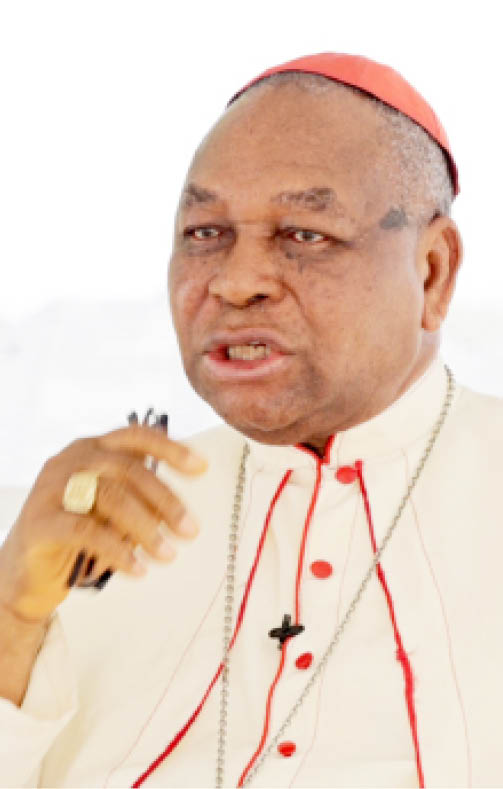Nigeria Sliding Towards Dictatorship – Cardinal Onaiyekan Warns on Inside Sources
The deterioration of trust between the Nigerian populace and its political leaders which started under the Buhari administration, according to the Catholic Archbishop Emeritus of Abuja John Cardinal Onaiyekan, is now deepening under the incumbent president. Besides, the Cardinal warned that care must be taken to avert what seems to be an impending slide of […]

Cardinal Onaiyekan
The deterioration of trust between the Nigerian populace and its political leaders which started under the Buhari administration, according to the Catholic Archbishop Emeritus of Abuja John Cardinal Onaiyekan, is now deepening under the incumbent president.
Besides, the Cardinal warned that care must be taken to avert what seems to be an impending slide of the country into civilian dictatorship.
The Prelate and prominent cleric spoke while appearing on Inside Sources with Laolu Akande on Channels Television on Sunday.
Archbishop Onaiyekan cautioned that the lack of trust is pushing the country toward authoritarian rule and endangering the foundations of its democracy.
“We have been talking about trust deficit in this country since the days of [President Muhammadu] Buhari. I dare to say even now under [President Bola] Tinubu, that trust deficiency is still worse,” Onaiyekan remarked, underscoring the prevailing disconnect between the Nigerian people and their leaders.
The Cardinal emphasized that effective governance cannot thrive when there is a lack of trust and communication between the government and the governed. He likened the current relationship to a patient who is unwilling to take medication prescribed by a doctor they do not trust.
“No matter what system of government you have, if there is a disconnect between the people and the government, it wouldn’t work,” he noted. “We realize things are difficult in this country now, a lot of problems, a lot of things, we understand. Even sometimes, Mr. President tells us that he feels these pains but that we should accept the pains like a bitter pill. Before you take a bitter pill, you need to assure the patient that he believes that this pill is good for him. But if the patient either does not have any trust in the doctor who is prescribing the pills or he actually knows that this pill will not solve my problem, he will not accept the pill. If he doesn’t accept the pill, he will not cooperate.”
Cardinal Onaiyekan criticized the political leadership for suppressing dissent and ignoring the voices of ordinary Nigerians. He pointed to the protests against poor governance, such as the #EndBadGovernance movement, as evidence of public frustration that has been consistently disregarded by those in power.
“The people want their power but they have no more access to it. Their voices are not listened to by those who ought to listen to it,” Onaiyekan said. “And once in a while, some people shout too loudly. Those in power are not ready to be disturbed in power. They claim that you are distracting them.
In August during the #EndBadGovernance protests, a large number of people keyed into that idea that we don’t have good government on our hands. And that the situation we have should not continue. And they made noise about it. The rulers agreed that they have the right to make noise about it. What one will expect, therefore, is that the rulers should listen. If you don’t let people air their opposition to how they are being ruled, then we are in a dictatorship and we should stop talking about democracy.”
The Archbishop Emeritus also lamented the lack of integrity and truth in Nigeria’s political system, accusing leaders of serving their own interests rather than those of the people. He pointed out the lavish lifestyle of lawmakers, contrasting it with the harsh economic realities faced by the majority of Nigerians.
“We run a government that is not being run on truth. There is so much fakery. Do they represent us? You cannot have a government when all you have is people just helping themselves. A lot of people are there taking what they don’t deserve,” he asserted.
“After the elections, non-APC members in the National Assembly, even some new figures called the Labour Party, up till today, after more than 18 months, we have never seen any case where so-called non-APC have disagreed with the APC. We have never seen them say, ‘No, we don’t deserve N40 million a month. The people we left behind are still struggling with 70,000.”
Cardinal Onaiyekan stressed that political leadership must recognize its limitations and collaborate with other sectors of society, including religious communities, to address the nation’s challenges. He emphasized that the role of religious leaders is not merely to support political figures but to serve as a voice for the people and uphold divine principles.
“Political leadership should understand the scope and limits of their leadership. And they know very well that they cannot do it alone. The political leadership has its own role. The country is more than politics. In the religious constituency, that one I can speak of, there are those that have been called by God to initiate the will of God for the people.”
Despite the disillusionment, Cardinal Onaiyekan expressed optimism that Nigerians would continue to resist authoritarian tendencies. He praised the resilience of the people, noting that unlike in some nations where citizens have given up, Nigerians still possess the spirit to demand better governance.
“Nigerians refuse to be treated as slaves. There are nations where the people have practically given up. You will not see anybody shouting anything. Those who are not happy have either gone on exile or are just sitting down waiting. I don’t think our country is that kind of a country,” he noted.
